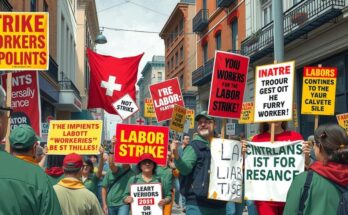President Kagame of Rwanda denied allegations of occupying the eastern DRC and criticized the United Nations peacekeeping mission, MONUSCO, for failing to address security concerns. He emphasized the need to tackle the root causes of conflict, highlighting the persistence of genocidal ideologies and questioning the legitimacy of Congolese leadership. His statements reflect Rwanda’s position on essential reform and regional stability.
President Paul Kagame of Rwanda firmly denied allegations of occupying the eastern Democratic Republic of Congo (DRC) during a recent address to diplomats in Kigali. He emphasized that Rwanda does not possess the capability to undertake such an occupation and countered claims by suggesting that the notion of Rwanda’s military presence in the DRC was implausible, stating that the country is significantly smaller and lacks the necessary resources for such an endeavor.
In his speech, lasting over 90 minutes, Kagame dedicated a substantial portion to discussing the ongoing crisis in Congo. He notably criticized the United Nations peacekeeping mission, MONUSCO, for its failure to address the security challenges in the mineral-rich eastern DRC, asserting that it has not succeeded in resolving persistent issues affecting the region.
Kagame highlighted the importance of recognizing and addressing the root causes of conflict rather than focusing on surface solutions. He pointed out that the ideologies promoting genocide remain alive among armed factions in eastern Congo, exacerbated by support from external government entities. He expressed, “If you want to really address a problem, there is no better way of doing that than bothering to look at the root cause.”
Moreover, he raised doubts regarding the legitimacy of Congolese President Félix Tshisekedi, implying that his leadership is contributing to regional tensions. Kagame remarked on the contradiction in international calls for democracy while noting the problematic nature of Tshisekedi’s election history, which could have implications for stability and governance in the DRC.
These comments reflect Rwanda’s complex role in the ongoing DRC conflict, with Kagame’s critique emphasizing the need for effective international responses rooted in fundamental issues rather than temporary fixes. His statements underscore Rwanda’s position on regional stability and the necessity for the global community to take action against persistent threats in the vicinity.
Overall, Kagame’s statements reveal a broader narrative concerning regional politics, the complexities of peacekeeping efforts, and the interplay of authority among eastern African nations.
The Democratic Republic of Congo has long faced internal strife, particularly in its eastern region, due to various armed groups and regional dynamics. Rwanda’s military history in the DRC dates back to the aftermath of the Rwandan genocide in 1994 when refugee flows and security concerns compelled Rwandan involvement. The United Nations peacekeeping mission, MONUSCO, was established to help stabilize the eastern DRC; however, it has faced criticism for its effectiveness against ongoing violence and instability in the region. Kagame’s statements come at a time when tensions between Rwanda and the DRC are heightened due to border security issues and accusations of interference.
President Kagame’s address addresses key concerns regarding Rwanda’s involvement in the DRC, the shortcomings of UN peacekeeping efforts, and the implications of regional governance. He stresses the importance of identifying and resolving underlying issues contributing to conflict. His remarks underscore the complexity of the situation in eastern Congo, emphasizing the need for renewed focus on root causes and effective international cooperation to promote stability in the region.
Original Source: eastleighvoice.co.ke




